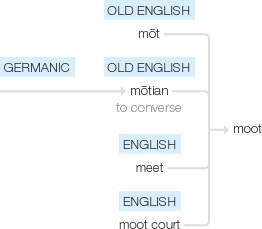Moot
Old English mōt ‘assembly or meeting’ and mōtian ‘to converse’, of Germanic origin; related to meet1. The adjective (originally an attributive noun use: see moot court) dates from the mid 16th century; the current verb sense dates from the mid 17th century.
wiktionary
From Middle English moot, mot, ȝemot, from Old English mōt, ġemōt(“moot, society, assembly, meeting, court, council, synod”), from Proto-Germanic *mōtą(“an encounter, meeting, assembly”), from Proto-Indo-European *meh₂d-(“to encounter, come”). Cognate with Scots mut, mote(“meeting, assembly”), Low German Mööt(“meeting”), Moot(“meeting”), archaic Dutch (ge)moet(“meeting”), Danish møde(“meeting”), Swedish möte(“meeting”), Norwegian møte(“meeting”), Icelandic mót(“meeting, tournament, meet”). Related to meet.
From Middle English moten(“to speak, talk, converse, discuss”), from Old English mōtian(“to speak, converse, discuss”). See also mutter (which is a frequentative of moot).
Unknown.
From Dutch moot(“piece”)
etymonline
moot (n.)
early 12c., from Old English gemot "meeting, formal assembly" (especially of freemen, to discuss community affairs or mete justice), "society, assembly, council," from Proto-Germanic *ga-motan (compare Old Low Frankish muot "encounter," Middle Dutch moet, Middle High German muoz), from collective prefix *ga- + *motan (see meet (v.)). In early 15c. awful moot was used for "the Last Judgment."
moot (adj.)
"debatable, subject to discussion," by 1650s, from moot case (1570s), earlier simply moot (n.) in the specialized sense "discussion of a hypothetical law case" (1530s) in law student jargon. The reference is to students gathering to test their skills in mock cases.
moot (v.)
"to debate, argue for and against" (mid-14c.), from Old English motian "to meet, talk, discuss, argue, plead," from mot "meeting" (see moot (n.)). Meaning "raise or bring forward for discussion" is from 1680s. Related: Mooted; mooting.
